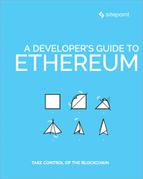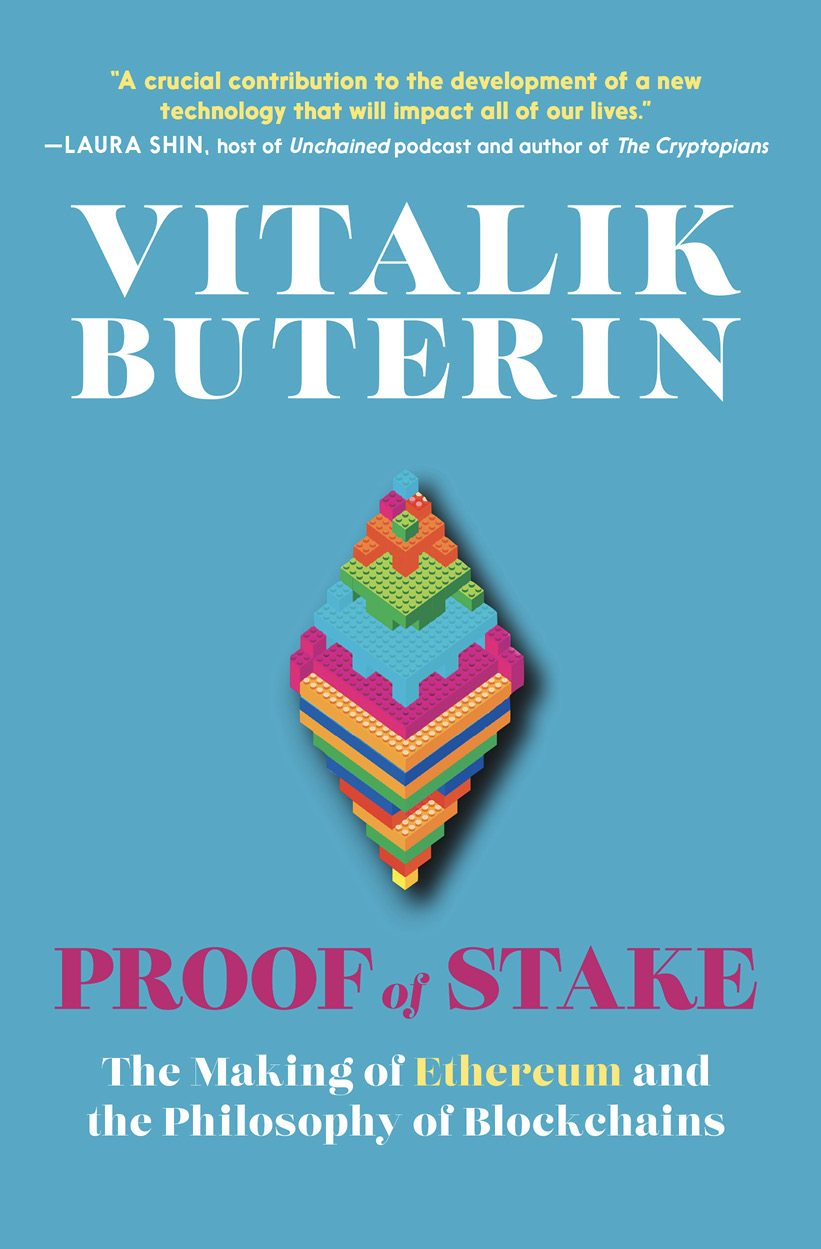Proof of Stake
The Making of Ethereum, and
the Philosophy of Blockchains
Vitalik Buterin
Edited by Nathan Schneider

Seven Stories Press
New York Oakland London
Copyright 2022 by Vitalik Buterin
Introductions and notes 2022 by Nathan Schneider
A SEVEN STORIES PRESS FIRST EDITION
All editions available under a Creative Commons Attribution-ShareAlike license. No part of this book may be used or reproduced in any form for commercial purposes without permission in writing from the publisher.
Seven Stories Press
140 Watts Street
New York, NY 10013
www.sevenstories.com
Library of Congress Cataloging-in-Publication Data is on file.
ISBN : 978-1-64421-248-6 (paperback)
ISBN : 978-1-64421-249-3 (ebook)
Printed in the USA.
9 8 7 6 5 4 3 2 1
To my mom and dad,
amazing and loving parents,
entrepreneurs and internet meme lords.
Table of Contents
Introduction
nathan schneider
Before he started building a new economic infrastructure for the internet at nineteen years old, before becoming a billionaire who sleeps on friends couches, Vitalik Buterin wanted to write. He first became curious about Bitcoin at the urging of his father, with whom he emigrated from Russia to Canada as a child. Rather than buying, borrowing, or mining his first coins, in 2011 he posted on an online forum: Would anyone pay him with Bitcoin to write about it?
Someone did. And Buterin kept on writing, to the point of cofounding Bitcoin Magazine , a glossy print and digital outlet chronicling the latest developments of what was then a very small and obscure subculture. This new, hard-to-use internet money held Buterins attention more than his first year at college did. From his time as a self-appointed reporter onward, his ideas developed in continual conversation with others. But among writings scattered over the years across various blogs, forums, and tweets, he exhibits a voice very much his own andpartly because of that voicehas built a rapt audience surrounding his invention, Ethereum. If Ethereum and its ilk become the kind of ubiquitous infrastructure they aspire to be, his ideas will need to be understoodand contestedmore widely.
This book is an introduction to Vitalik Buterin the writer.
When the pseudonymous figure Satoshi Nakamoto first announced the prototype for Bitcoin in 2008, during the storm of a global financial crisis, the goal was to create a currency organized through cryptographic computer networks, rather than through governments or banks. It would come to be called a cryptocurrency. Libertarian gold-bugs and techie cypherpunks reveled in the systems metaphors: digital mining, limited supply, cash-like transactions that could be secure and private. Buterin had all the instincts of that early target audience. But as his obsession with Bitcoin deepened, by late 2013 he began to recognize that its underlying blockchain technology might be the basis of something bigger: a way of creating organizations, companies, and entire economies native to the internet. And so he wrote about it. The initial Ethereum whitepaper, included as an appendix here, lit up the still-small cryptocurrency universe when it appeared near the end of that year. Rather than depending on old-world corporations, investors, and laws to govern the servers, this would be user-governed by default. Rather than Bitcoins metaphors of gold and mines, Ethereum culture followed the aesthetic of Buterins favorite T-shirts, with robots, unicorns, and rainbows as the preferred mascots.
Since Ethereum went online in 2015, there have been many competing blockchains, each able to do similar things in different ways. Ethereum remains the largest among them. Although its currency, called ether or ETH, is a distant second in total value compared to Bitcoin, if you add up the value of all the products and community tokens built on top of Ethereum, it has produced the biggest share of this strange new economy. During the projects early trials, Buterin became ever more Ethereums benevolent dictatorwhether he liked it or notless by any formal position than by the trust he instilled. The writings collected here have been central to building that trust.
In the process, Buterin has inhabited a space of contradiction. He wants to enable a radical reimagining of how human beings self-organize, while maintaining a rigorous agnosticism about what people choose to do with that power. Credible neutrality, as an essay below explains, is a principle for system design, but it also describes the role he has come to play as a leader. From the earliest personnel decisions for the Ethereum Foundation to the latest high-stakes software updates, and despite his best efforts to the contrary, his leadership has been hard to distinguish from Ethereum itself. While Ethereum and systems like it are designed according to the assumption that people are selfish, he is the ascetic who seems to want nothing in particular for himself other than to enable a crypto-powered future.
There are no guarantees, however, that this will be a future worth having. When Buterin first introduced Ethereum on stage, at an early-2014 Bitcoin conference in Miami, after a litany of all the wonders that could be built with it, he ended with a mic-drop reference to Skynetthe artificial intelligence in the Terminator movies that turns on its human creators. It was a joke that he would repeat, and like many well-worn jokes it bore a warning. Ethereum holds the potential for utopia and dystopia and everything in between:
It creates artificial scarcity by capping the availability of made-up tokens; but these enable communities to generate abundant capital that they can use and control.
It excludes people who cant or wont buy and trade risky internet money; it has also spurred the invention of novel governance systems that share power with unprecedented inclusivity .
It consumes vast amounts of energy just to perpetuate its own functioning; it also enables new ways of putting a price on carbon and pollution while governments refuse to do so.
It has produced nouveaux riches notorious for their extravagance, congregating in tax shelters and pricing out locals; it is also a borderless, user-owned financial system available to anyone with a smartphone.
It rewards a tech-savvy elite who got in early; it also presents a real chance for undermining the dominant tech companies.
It has produced a speculative financial system before a real economy of useful things; yet far more than in a stock market, ownership lies with the people creating the value.
It has showered vast payouts on digital collectibles with little apparent worth; the result is a new business model to support the making and sharing of open-access culture.
It promises to make early adopters wealthy at the expense of future generations; it gives those generations a set of building blocks whose uses are up to those who do the building.
Readers of what follows must hold these contradictions in mind and contend with them, ascertaining for themselves and their communities which options should win out. The contradictions can be vexing and distressing, but also motivating. They are still hot enough to be shaped.
At the heart of any blockchain-based system like Bitcoin or Ethereum is the consensus mechanism. This is the process by which computers agree on a common set of data and protect it against manipulationwhether it be a list of transactions, as for Bitcoin, or the state of the Ethereum world-computer. Consensus without a central authority is not easy. Bitcoin uses a mechanism called proof of work, which means lots of computers expend lots of energy doing math problems, all in order to prove that they are invested in keeping the system secure. The people behind those computers, known as miners, get paid for doing so, and they consume country-sized volumes of electricity, producing the carbon emissions that level of consumption requires. Ethereum adopted proof of work as well, for want of a functional alternative at the time. But even before it went online Buterin was already talking about switching, once his team had worked out the kinks, to another mechanism: proof of stake. In proof of stake, users prove their skin in the game with token holdings rather than computing power. Energy consumption is minimal. If token holders try to corrupt the system, they lose the tokens they staked.


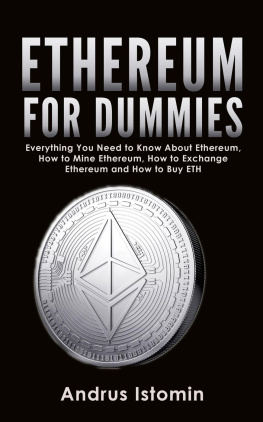

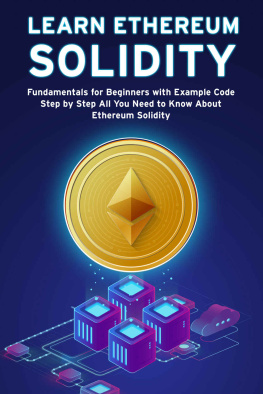
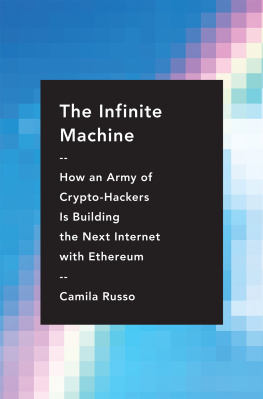
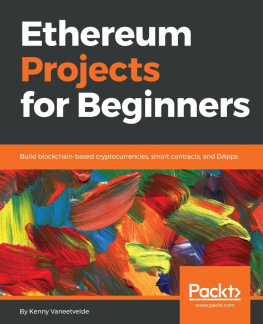
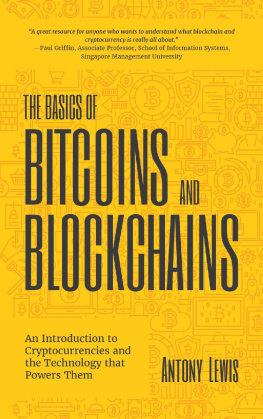
![Chris Dannen [Chris Dannen] - Introducing Ethereum and Solidity: Foundations of Cryptocurrency and Blockchain Programming for Beginners](/uploads/posts/book/119690/thumbs/chris-dannen-chris-dannen-introducing-ethereum.jpg)
![Kenny Vaneetvelde [Kenny Vaneetvelde] - Ethereum Projects for Beginners](/uploads/posts/book/119688/thumbs/kenny-vaneetvelde-kenny-vaneetvelde-ethereum.jpg)
